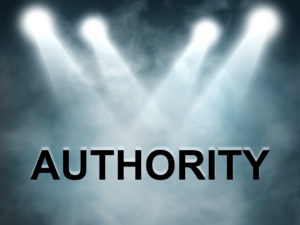 I have been highlighting the issue of authority and submission to authority in several of my recent blogs. I am giving so much attention to this subject because I believe it is so essential to Christians living a life that is pleasing to God. After all, every person is under some authority and everyone exercises some authority over someone else in some way or another.
I have been highlighting the issue of authority and submission to authority in several of my recent blogs. I am giving so much attention to this subject because I believe it is so essential to Christians living a life that is pleasing to God. After all, every person is under some authority and everyone exercises some authority over someone else in some way or another.
When trying to understand authority, it is important to define the term accurately. I have used a couple of definitions to help me understand this all-important area of life.
Authority is the right or power to command and exact obedience and/or an accepted source of expert information.
Once authority is defined accurately, it is then important to put one’s authority in the proper perspective. When I consider authority, I see it as a stewardship responsibility from God. Again, it is important that we have a clear understanding of what stewardship is. Stewardship is defined in the dictionary as:
The careful and responsible management of something entrusted to one’s care.
In order for something to be entrusted in to one’s care, someone else must first own that something. That person must have the power to  give what he/she owns to another person’s care. When I considered the many aspects of stewardship found in Scripture, I defined stewardship this way.
give what he/she owns to another person’s care. When I considered the many aspects of stewardship found in Scripture, I defined stewardship this way.
It is the use and/or management of something that an owner gives to me in order for the owner to receive gain or profit.
Another way of putting this is what someone posted online. The person made this statement.
Stewardship is the maximizing God’s blessings for His glory!
This is clearly the concept that one finds when reading the parable of the talents in the gospels. The owner gave certain amounts of his talents to three servants. The servants who managed the owner’s talents and produced a profit for him were praised and rewarded. However, the one servant who did nothing with the owner’s property and simply returned what he had been given back to the owner was criticized and lost everything.
Based on these definitions, I believe that authority, when properly understood, becomes a stewardship responsibility. Christians believe that God is the creator of the universe and is sovereign over all things. God is literally the owner of everything that exists in both heaven and earth. This means that He has ultimate authority over everything. He, alone, has the right and power to command and exact obedience from the entire created universe. He not only has the authority over all people but also over all of creation. This is seen when Jesus told the wind and the waves to be still and they obeyed. It can be said that God is authority!
 No matter how much authority I might attain, I must always realize that I am not in charge. God is the only One who is sovereign and has all authority. Jesus made this clear when He stated,
No matter how much authority I might attain, I must always realize that I am not in charge. God is the only One who is sovereign and has all authority. Jesus made this clear when He stated,
And Jesus came up and spoke to them, saying, “All authority has been given to Me in heaven and on earth. Matthew 28:18
Who has given Jesus all authority? It is God the Father who has done this. The Father can do this because He is the supreme ruler of all things. Consider these verses.
[God] brings princes to nothing, and makes rulers of the earth as emptiness. Isaiah 40:23
O Lord, God of our fathers, are you not God in heaven? You rule over all the kingdom of the nations. In your hand are power and might, so that none is able to withstand you. 2 Chronicles 20:6
The Lord has established His throne in heaven, and His kingdom rules over all. Psalm 103:19
Scripture also makes it clear that God gives a portion of His ultimate authority to man. Consider the following verses.
Let Us make man in Our image, according to Our likeness; let them have dominion over the fish of the sea, over the birds of the air, and over the cattle, over all the earth and over every creeping thing that creeps on the earth…Be fruitful and multiply; fill the earth and subdue it; have dominion over the fish of the sea, over the birds of the air, and over every living thing that moves on the earth. Genesis 1:26-27
The heaven, even the heavens, are the Lord‘s: but the earth hath He given to the children of men. Psalm 115:16
Since God “owns” or “is” authority, any authority I might possess has to have been given to me by God. In line with all the other stewardship responsibilities that God has given me, I must use, manage, and/or invest my authority in such a way that it will bring Him gain or profit. This is in essence what it means to glorify God. The stewardship of my authority as a parent, teacher, administrator, church member, etc. must be exercised in such a way that it brings Him glory.
Here are some question that come to my mind when I think about the authority that God has given me. How would you answer them? Better yet, how would those whom you have authority over answer these questions?
- Have you looked at any authority you might have as being given to you by God?
- Since any authority you have has been given to you by God, what are some of the ways that you should exercise that authority so that God will be glorified?
- In what ways have you been a poor steward of the authority God has given you in some area(s) of life?
- What are some things you will do in the future as you steward the authority that God has given you?
I always appreciate your comments that you can leave below. Next week I am going to share a model of authority that has helped me be a better steward of any and all authority God has given to me.

 Over the past couple of weeks I have attempted to address the issue of authority and subjection from a biblical perspective. So far, we have seen how authority is set in place for the purpose of function not importance. Anyone who finds himself in a position of authority is not to think more highly of himself than those he is leading.
Over the past couple of weeks I have attempted to address the issue of authority and subjection from a biblical perspective. So far, we have seen how authority is set in place for the purpose of function not importance. Anyone who finds himself in a position of authority is not to think more highly of himself than those he is leading. what he thought to be best. Sinful man’s condition can be summed up in the phrase that is found throughout the book of Judges.
what he thought to be best. Sinful man’s condition can be summed up in the phrase that is found throughout the book of Judges. Do not be deceived, God is not mocked; for whatever a man sows, that he will also reap. Galatians 6:7
Do not be deceived, God is not mocked; for whatever a man sows, that he will also reap. Galatians 6:7
 was surprising so I asked them to explain it. Students explained when people in authority were not willing to set clear boundaries and hold them accountable to staying within those boundaries, they believed that their authority didn’t care about them. They got the sense that their authority, many times their parents, wanted to be “liked” by them and were more interested in their own comfort rather than the good of the child.
was surprising so I asked them to explain it. Students explained when people in authority were not willing to set clear boundaries and hold them accountable to staying within those boundaries, they believed that their authority didn’t care about them. They got the sense that their authority, many times their parents, wanted to be “liked” by them and were more interested in their own comfort rather than the good of the child. If you want to get a good argument going, all you have to do is bring up the topics of authority and submission. Trying to discuss the importance of authority and submission in today’s culture is sure to ignite a lot of healthy and not-so-healthy debate. Yet, it is important to have a biblical understanding of these two words if any marriage, organization, or society is going to be able to survive. In fact, the reason we are such a divided country and why there is so much crime, corruption and mistrust in all aspects of life is because we have rejected all forms of authority that are necessary for a civilization to survive.
If you want to get a good argument going, all you have to do is bring up the topics of authority and submission. Trying to discuss the importance of authority and submission in today’s culture is sure to ignite a lot of healthy and not-so-healthy debate. Yet, it is important to have a biblical understanding of these two words if any marriage, organization, or society is going to be able to survive. In fact, the reason we are such a divided country and why there is so much crime, corruption and mistrust in all aspects of life is because we have rejected all forms of authority that are necessary for a civilization to survive. submit to the Father’s will.
submit to the Father’s will. all changed when sin entered the picture. In fact, the actual sin that Adam committed was the rejection of God’s authority in his life. By eating of the fruit that God had forbidden him to eat, Adam was rebelling against God’s authority to tell him what he should and/or should not do. In reality, all sin is some form or another of man’s refusal to submit to the will of God. It shows that man is determined to live his life by, in the words of Frank Sinatra, doing it MY way! (emphasis mine).
all changed when sin entered the picture. In fact, the actual sin that Adam committed was the rejection of God’s authority in his life. By eating of the fruit that God had forbidden him to eat, Adam was rebelling against God’s authority to tell him what he should and/or should not do. In reality, all sin is some form or another of man’s refusal to submit to the will of God. It shows that man is determined to live his life by, in the words of Frank Sinatra, doing it MY way! (emphasis mine). important is because it also means that every time anyone in history has refused to submit to his/her authority, he/she has, in essence, rejected God’s authority in his/her life. This is specifically stated in Scripture when Israel demanded a king. God told Samuel that the people weren’t rejecting Samuel but were rejecting Him.
important is because it also means that every time anyone in history has refused to submit to his/her authority, he/she has, in essence, rejected God’s authority in his/her life. This is specifically stated in Scripture when Israel demanded a king. God told Samuel that the people weren’t rejecting Samuel but were rejecting Him. I don’t ever remember when American culture was more divided. It seems that when topics such as government, public spending, regulations, social welfare, individual rights, and race or gender are discussed, there are two polarizing sides each claiming to be right. Even more disconcerting is the fact that each side claims that the other side is endangering our freedom and liberty. The two sides even claim that they are trying their best to “defend the US Constitution”.
I don’t ever remember when American culture was more divided. It seems that when topics such as government, public spending, regulations, social welfare, individual rights, and race or gender are discussed, there are two polarizing sides each claiming to be right. Even more disconcerting is the fact that each side claims that the other side is endangering our freedom and liberty. The two sides even claim that they are trying their best to “defend the US Constitution”. starting point. They are starting with the Constitution being the foundation stone for freedom and liberty.
starting point. They are starting with the Constitution being the foundation stone for freedom and liberty. Of all the dispositions and habits which lead to political prosperity, religion and morality are indispensable supports. George Washington
Of all the dispositions and habits which lead to political prosperity, religion and morality are indispensable supports. George Washington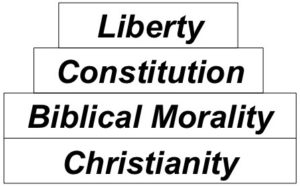 Unfortunately, these two cornerstones of liberty have been purged from our educational institutions today, from preschool through graduate school. Of course, this had to happen when Americans said that education must be secular and there had to be separation of church and state at all levels of public life, especially schooling. In last week’s blog, I showed how secular education may not directly attack God and/or the Bible. Instead, secular education simply says it is removing any “religious” bias or reasoning from learning. That is because secularists believe that religious/spiritual things are personal and subjective. There is no place for them in the public arena that is concerned only with “neutral” facts and knowledge.
Unfortunately, these two cornerstones of liberty have been purged from our educational institutions today, from preschool through graduate school. Of course, this had to happen when Americans said that education must be secular and there had to be separation of church and state at all levels of public life, especially schooling. In last week’s blog, I showed how secular education may not directly attack God and/or the Bible. Instead, secular education simply says it is removing any “religious” bias or reasoning from learning. That is because secularists believe that religious/spiritual things are personal and subjective. There is no place for them in the public arena that is concerned only with “neutral” facts and knowledge.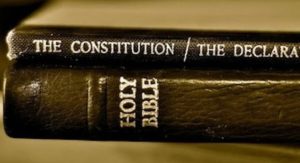
 I asked some questions in this week’s email blast. If you are reading this, you probably tried to answer these questions and want to know how you did. The three questions (along with the answers) I asked in my email were:
I asked some questions in this week’s email blast. If you are reading this, you probably tried to answer these questions and want to know how you did. The three questions (along with the answers) I asked in my email were: A young man named Kermit Beahan peered through the rubber eyepiece of the bombsight, and he could see some of the buildings of Kokura and the river that ran by the arms factory. But the complex itself was blocked by a cloud. So Bock’s Car gave up on Kokura and went on to its secondary target, Nagasaki. Clouds also partly obscured Nagasaki, but not quite enough of it.
A young man named Kermit Beahan peered through the rubber eyepiece of the bombsight, and he could see some of the buildings of Kokura and the river that ran by the arms factory. But the complex itself was blocked by a cloud. So Bock’s Car gave up on Kokura and went on to its secondary target, Nagasaki. Clouds also partly obscured Nagasaki, but not quite enough of it. 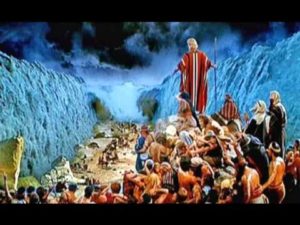
 second battle.
second battle. history (or any other subject where He is ignored). The result from this type of dualistic thinking and teaching is that young people end up believing that Christianity does not provide answers to life’s big questions. Ken Ham in his book, Already Gone, discovered this dilemma when he talked with young adults who left the church soon after high school graduation. These young adults said,
history (or any other subject where He is ignored). The result from this type of dualistic thinking and teaching is that young people end up believing that Christianity does not provide answers to life’s big questions. Ken Ham in his book, Already Gone, discovered this dilemma when he talked with young adults who left the church soon after high school graduation. These young adults said, challenges in the days ahead. These challenges are a result of society’s move away from biblical principles guiding their decisions.
challenges in the days ahead. These challenges are a result of society’s move away from biblical principles guiding their decisions. its intensity in recent years. In fact, Meyer’s book was written in 2008. We are now reaping the consequences of not addressing these issues for many years. This brings me to the crisis facing today’s parents and the education of their children. The article I was reading stated that Americans [parents] right now are so busy that they really don’t invest very much in trying to understand everything that’s going on around them…in fact, they don’t invest much at all in trying to discern truth. Pay careful attention to what Barna actually said.
its intensity in recent years. In fact, Meyer’s book was written in 2008. We are now reaping the consequences of not addressing these issues for many years. This brings me to the crisis facing today’s parents and the education of their children. The article I was reading stated that Americans [parents] right now are so busy that they really don’t invest very much in trying to understand everything that’s going on around them…in fact, they don’t invest much at all in trying to discern truth. Pay careful attention to what Barna actually said. How does all of this bode for future generations across the land? It does not bode well for future generations because Millennials are America’s primary parenting generation today according to Barna. If our hope is to see our children and youth develop a biblical worldview and change the direction we are going in, we have to ask ourselves the question, Where will they get a biblical worldview from? If only 4% of the primary parenting generation has a biblical worldview, their children have little chance of developing one on their own. Barna put it this way.
How does all of this bode for future generations across the land? It does not bode well for future generations because Millennials are America’s primary parenting generation today according to Barna. If our hope is to see our children and youth develop a biblical worldview and change the direction we are going in, we have to ask ourselves the question, Where will they get a biblical worldview from? If only 4% of the primary parenting generation has a biblical worldview, their children have little chance of developing one on their own. Barna put it this way. I was on a flight to the Answers in Genesis’ Creation Museum to speak at a worldview conference. Since this was my first flight in March, I picked up the current issue of Sky Magazine to see if there was anything interesting in it. As I glanced at the cover, my attention was drawn to a headline. On the cover of this issue of of the magazine was a picture of Oprah Winfrey. Next to her picture in bold letters I read these words, Living Her Truth. Of course, I was intrigued and quickly turned to this lead article. When I arrived at the article, the title page captured my full attention. The entire page was a strong shade of red. There was a large O with the words of the article’s title inside the O. The title read The Wisest Woman in the World.
I was on a flight to the Answers in Genesis’ Creation Museum to speak at a worldview conference. Since this was my first flight in March, I picked up the current issue of Sky Magazine to see if there was anything interesting in it. As I glanced at the cover, my attention was drawn to a headline. On the cover of this issue of of the magazine was a picture of Oprah Winfrey. Next to her picture in bold letters I read these words, Living Her Truth. Of course, I was intrigued and quickly turned to this lead article. When I arrived at the article, the title page captured my full attention. The entire page was a strong shade of red. There was a large O with the words of the article’s title inside the O. The title read The Wisest Woman in the World.
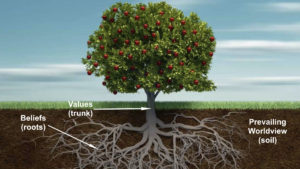
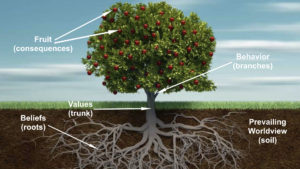
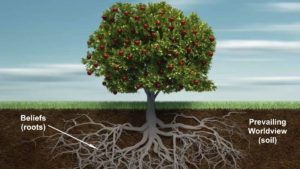 This series is taking the metaphor of a tree and relating it to raising the next generation to think and act from a biblical worldview. We have identified several keys to growing healthy trees. These include:
This series is taking the metaphor of a tree and relating it to raising the next generation to think and act from a biblical worldview. We have identified several keys to growing healthy trees. These include: We have been looking at what it takes to grow healthy trees. Growing healthy trees is a metaphor for raising young people to be disciples of Jesus who can engage today’s postmodern culture by thinking and acting from a biblical worldview. In last week’s blog I asked the readers to identify some of the lies that are foundational to a secular worldview. These lies are what keeps people and societies in bondage. If we don’t identify them, we will not be able to break the chains that they have on our individual lives, families, churches and communities. Here is the list of lies that I posted last week. I have added some additional lies that various readers shared with me last week.
We have been looking at what it takes to grow healthy trees. Growing healthy trees is a metaphor for raising young people to be disciples of Jesus who can engage today’s postmodern culture by thinking and acting from a biblical worldview. In last week’s blog I asked the readers to identify some of the lies that are foundational to a secular worldview. These lies are what keeps people and societies in bondage. If we don’t identify them, we will not be able to break the chains that they have on our individual lives, families, churches and communities. Here is the list of lies that I posted last week. I have added some additional lies that various readers shared with me last week.
Recent Comments